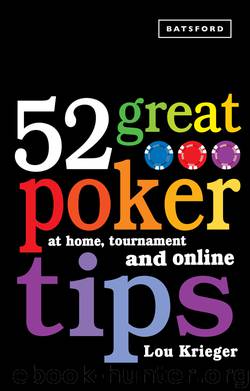52 Great Poker Tips by Lou Krieger

Author:Lou Krieger [Krieger, Lou]
Language: eng
Format: epub
ISBN: 978-1-84994-187-7
Publisher: Pavilion Books Company Limited
Published: 2006-12-31T16:00:00+00:00
Tip 28
Record Keeping
Without accurate records, you’ll never know how good a player you are. If you are serious about poker you have to treat your game as a business or a profession. Every business keeps records. Without them, a business owner has no idea of what it costs to make, sell or inventory their product, and no way of knowing whether their bottom line will be written in black or red.
In hold’em, as in every form of poker, you need to be concerned about two basic statistical parameters: your win rate, which is the average amount of money won or lost per hour or per hundred hands; and the standard deviation, which measures those short-term fluctuations we all call ‘luck.’
Next time you play poker take a small note pad and pencil with you and record the amount of your buy-in. Then record the following information each hour:
Amount won or lost during that hour.
The game you’re playing in (e.g. $2–$4 hold’em).
Total hours played that session, or the number of hands if you’re playing online. Because so many more hands are dealt per hour online, you can equate 100 online hands to three hours of regular casino poker.
When you get home, you’ll also want to record this cumulative information:
The amount won or lost for the entire year to date.
The total number of hours or hands played during the current year.
Computing your win or loss rate is simple. Divide the amount of money won or lost by the number of hours or hands played. This shows the average amount won or lost per hour or per hundred hands played.
Knowing how much you are winning or losing is important. But it is equally important to know whether that average, or mean, is an accurate indicator of the data it represents.
In poker, two players might each win an average of $15 per hour. But one might experience big wins and big losses very infrequently, while the other often experiences substantial fluctuations to arrive at the same average winnings. The player who can achieve that win rate while putting less of his or her money at risk is generally better off.
That’s where the standard deviation comes into play, and you can calculate it by hand, on most pocket calculators, or on any computer spreadsheet program.
Maximizing your hourly winnings while minimizing your standard deviation is a real conundrum. If you choose to take the risks required to maximize winnings, such as getting all those extra bets in whenever you believe you have the best of it, you tend to increase bankroll fluctuations because you’re not going to come out on top in every one of those marginal situations.
If calculating your standard deviation still seems burdensome, here’s a shortcut. Calculate it for 100 hours play. Then do the same thing a few months later. See if you’ve been able to reduce your standard deviation while increasing or at least maintaining your win rate. If you’re able to do this, you’ve reduced the amount of money you’re risking. The gamble, in essence, has got better.
Download
This site does not store any files on its server. We only index and link to content provided by other sites. Please contact the content providers to delete copyright contents if any and email us, we'll remove relevant links or contents immediately.
Secrets of the JavaScript Ninja by John Resig Bear Bibeault(21366)
Kotlin in Action by Dmitry Jemerov(20426)
Grails in Action by Glen Smith Peter Ledbrook(17372)
Sass and Compass in Action by Wynn Netherland Nathan Weizenbaum Chris Eppstein Brandon Mathis(14803)
WordPress Plugin Development Cookbook by Yannick Lefebvre(4419)
Ember.js in Action by Joachim Haagen Skeie(4310)
Mastering Azure Security by Mustafa Toroman and Tom Janetscheck(3543)
Learning React: Functional Web Development with React and Redux by Banks Alex & Porcello Eve(3183)
The Innovators: How a Group of Hackers, Geniuses, and Geeks Created the Digital Revolution by Walter Isaacson(3172)
A Blueprint for Production-Ready Web Applications: Leverage industry best practices to create complete web apps with Python, TypeScript, and AWS by Dr. Philip Jones(3131)
Mastering Bitcoin: Programming the Open Blockchain by Andreas M. Antonopoulos(3037)
The Art Of Deception by Kevin Mitnick(2800)
Drugs Unlimited by Mike Power(2592)
Hands-On Cybersecurity with Blockchain by Rajneesh Gupta(2463)
Kali Linux - An Ethical Hacker's Cookbook: End-to-end penetration testing solutions by Sharma Himanshu(2390)
Writing for the Web: Creating Compelling Web Content Using Words, Pictures and Sound (Eva Spring's Library) by Lynda Felder(2350)
SEO 2018: Learn search engine optimization with smart internet marketing strategies by Adam Clarke(2262)
JavaScript by Example by S Dani Akash(2220)
DarkMarket by Misha Glenny(2209)
